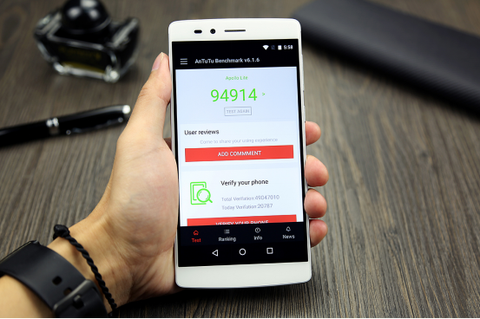Three months ago ago Vernee released the info about two incoming flagship models – Vernee Apollo (equipped with Helio X25) and Vernee Apollo Lite (Helio X20) and today we have finally the first Antutu result out for the Lite version. And the almost 95.000 points look pretty powerful on paper.
Helio X20 is one of the key Mediatek products for 2016 aimed at the high midrange or even high-end devices and offering quite some punch for a reasonable amount of money. Judging by the recent popularity of the chip, for example used in LeEco Le 2 or Meizu Pro 6 we can expect to see much more of it with more chinese flagships being released.
Aside the powerful performance the Mediatek Helio X20 features an important technology with Tri-Cluster reducing the energy consumption by 30 %, at least according to the manufacturer.
With such Antutu score and the $229.99 retail price tag the Vernee Apollo Lite can aspire to be one of the best price/performance ratio phones available for the coming months. Currently it’s still in the presale period and first shipments are expected to be realized somewhere in July.
Follow Gizchina.com on Google News for news and updates in the technology sector.

i have to say it’s a performance monster !
The battery life doesn’t indicate any power savings.
you have no idea how is the feature of X20, the biggest advantage of Helio X20 is this: It can delegate simple tasks to one cluster of cores, while directing more-complex (and more-power-hungry) tasks to the other clusters. If the smartphone is doing only simple tasks – such as sending text messages or running the calculator – on one cluster, the other clusters can power down, and therefore drive smoother performance and extended battery life .
MTK claims the new power management technology of Helio X20 will bring pleased performance of 30% less power consumption, and supports low-power applications such as MP3 playback and speech enhancement.
YAY NUMBERS!!!!
Please make an game performance compare test Galaxy S7 v.s. Vernee Apollo Lite so we can see how optimised the apollo lite firmware currently is ( yes i know it will first will be truely optimised in later firmware versions and when the job has been done , But Galaxy S7 has been around now for long and is rather optimised for bugs ,so it could be fun to see an compare)